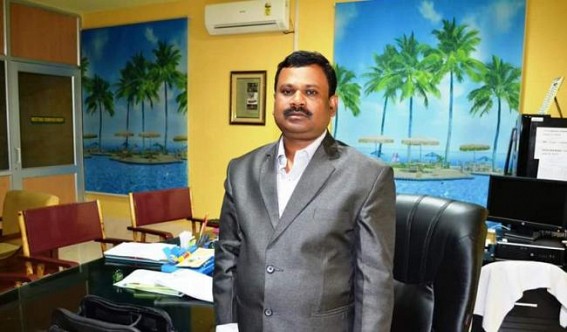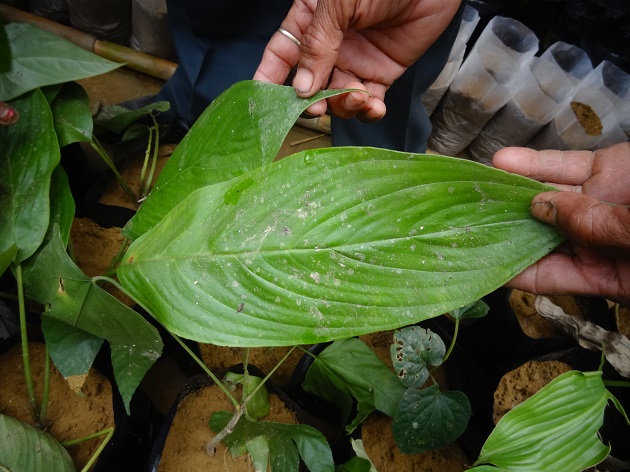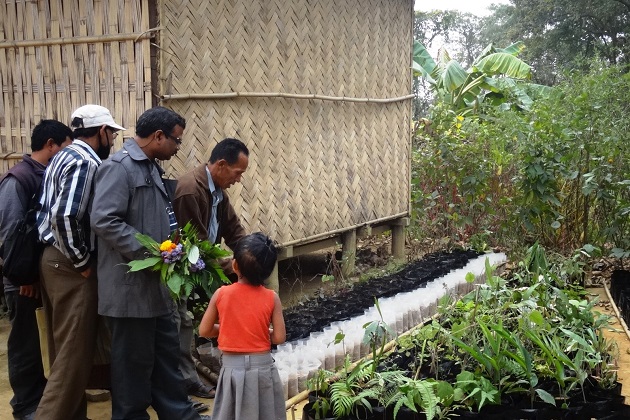Tripura News
Home > Tripura News
Community approach in conservation of herbal plants for traditional health care in Tripura
TIWN
TIWN

PHOTO : PAWAN K. KAUSHIK,Scientist E, Regional Director, CENTRE FOR FOREST-BASED LIVELIHOODS & EXTENSION (CFLE)
AGARTALA, Feb 18 (TIWN): The Vaidyaraj Herbal Growers Society (VHGS) has set up homestead and farmland based small herbal gardens in Kanchanpur area of North Tripura district with the technical support of Centre for Forest-based Livelihood and Extension (CFLE) Agartala in Tripura. CFLE has evolved this participatory mechanism under the “Direct to Consumer Scheme†of ICFRE to facilitate easy accessibility of medicinal plant products to the practitioners of traditional medicines. These gardens will also help to conserve the local biodiversity.
On demand from the local stakeholders, CFLE has taken an initiative the activities in the State.
Pawan Kumar Kaushik, the Senior Scientist of the Centre said that the initiative was taken keeping in view the Government’s emphasis on AYUSH and to promote and preserve traditional medicines and traditional knowledge in health care management as well as provide forest-based livelihood generation for herbal growers and practitioners.
Atanu Saha DyCF in CFLE, said that the VHGS has actively participated and helped us a lot in documentation of traditional knowledge on herbal medicines.
“Till now, different parts of about 110 plant species used by the traditional healers have been documented about 40 per cent of which are collected for roots,” he said.
Amiya Choudhury, President, Vaidyaraj Herbal Growers Society (VHGS) informed that the initiative taken by CFLE has been a very good motivation for the traditional medicines practitioners of the locality.

“We have 55 members in our society who can cure anything from rabies and kidney stones to malaria and bones shattered in an accident,” he claimed.
Choudhury said that several small plots of land owned by the Kavirajs had been sown with a variety of medicinal plants with the technical support of CFLE.
Such gardens have been established at Netaji Nagar, Suknochora, Purba Satnala, Monosuchoi, Company Para and Mitrajoy Para in Kanchanpur area.
“As many of these plant materials have become scarce in forests due to large scale deforestation and other reasons these herbal gardens at our homesteads will make for easy availability and continuity,” he said.
Research scholar Deepankar Deb, specialized in plant taxonomy, said that the plant roots are the important ingredients in most of the traditional medicines; existence of these plants are in great threat.
“There is no means to renew the diversity of the flora thus lost once, as the plant is uprooted and the roots are used to prepare medicine. There is always a threat to these important plants to become scarce and one day the same is not found at all,” he said.

The herbal gardens would be of great help to conserve these medicinal plants, he further said.
Deb reiterated that in Hyderabad an NGO was doing a lot of good work to organise traditional medicine practitioners and that this was the first initiative to organise them here.
Mr. Kaushik informed that out of these, 30 per cent species categorised under RET (rare, endangered and threatened) list including locally important plants like Ashok (Saraca asoca), Sukchini or Kumarika (Smilax glabra), Chalmogra (Hydnocarpus kurzii), Dalmogra (Gynocordia spp.), Sarpagandha (Rauvolfia serpentina), Keya (Pandanus tectorius) etc. Different methods of their propagation for further multiplication can be studied in future course, he informed.

Add your Comment
Comments (0)
More Tripura News
- Strict Regulations Imposed: If you Park in Illegal Spots in Agartala, you might not find your Vehicle
- Fire Rages Through Variety Store in Champamura Market
- 'Intolerable.....' Corporators Lodged FIR against Madhabi Biswas over 'Insane Video' on social media targeting PM & Mayor
- Blood Donation Camp Organized in Sipahijala District
- Yuvrajnagar Panchayat Samiti Chairperson's Husband Denies Molestation Allegations



